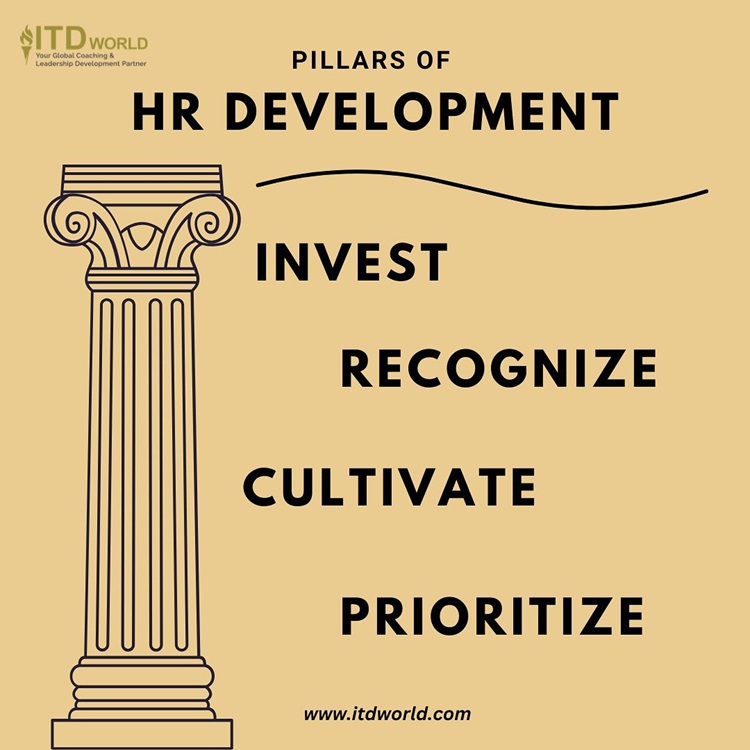Explore the essential principles and practices of Human Resources Management – how HR plays a pivotal role in shaping organizational success, managing talent, and fostering a positive workplace culture with our guide.
|
Author: Jonathan M. Pham |
Highlights
- Core Function and Scope: Human Resources (HR) is the backbone of any business, overseeing all aspects related to the organization’s workforce. Its fundamental role is optimizing human capital for the benefit of both the company and its employees, encompassing a wide array of functions like recruitment, financial administration, employee engagement, and talent development.
- Key Responsibilities: HR professionals manage critical operational and strategic tasks, including: Recruitment and Staffing (acquiring talent), Employee Relations (mediation and communication), Learning and Development (L&D) (designing training programs), Performance Management (setting expectations and providing feedback), Talent Management (the entire employee lifecycle, including succession planning), and ensuring Compliance with labor laws.
- Strategic Importance: HRM maximizes the potential of a company’s “most valuable asset”—its employees. It ensures safety, health, and satisfaction, minimizes organizational risk through compliance and issue resolution, fosters better team dynamics, and improves employee retention by designing competitive compensation and development strategies.
- Essential Skills: Success in HR requires a blend of interpersonal and analytical skills. Key attributes include Discernment & Discretion (for handling confidential data), Conflict Resolution, Emotional Intelligence (empathy), an Analytical Mind (for data-driven decisions), Adaptability, and strong Communication and Interpersonal skills.
- Challenges and Career Path: HR faces challenges in the modern workplace, such as finding and attracting top talent, addressing the skills gap and training needs, managing Diversity, Equity, and Inclusion (DEI) initiatives, and adapting to remote/hybrid work models. A career typically starts with a bachelor’s degree in a related field, and progression is supported by continuous learning and professional certifications.
What is Human Resources?
Often referred to as the backbone of any business, Human Resources (HR) department is in charge of overseeing all aspects related to the organization’s workforce. While encompassing a wide array of responsibilities, HR fundamentally revolves around optimizing human capital for the benefit of the organization and its employees.
At its core, HR deals with a vast spectrum of tasks and functions that collectively contribute to a cohesive and thriving work environment. These include – but are not limited to: recruitment, financial management, C&B administration, employee engagement, culture cultivation, talent development, corporate training, learning & development (L&D), etc. Each of these facets plays a pivotal role in shaping an organization’s effectiveness, resilience, and capacity for growth.

What Does HR Do?
Human resource development is the integrated use of training, organization, and career development efforts to improve individual, group, and organizational effectiveness.
Whether it’s orchestrating the recruitment and onboarding of new talent or safeguarding an organization’s compliance with labor laws, HR professionals are indispensable in nurturing a productive and harmonious workplace environment.
-
Recruitment and Staffing
At the heart of HR’s responsibilities lies the task of identifying and acquiring the right talent to fulfill organizational objectives. This involves crafting compelling job descriptions, screening resumes, conducting interviews, and making the final selections.
HR professionals play a pivotal role in matching candidates’ skills, experiences, and aspirations with the organization’s needs.
-
Employee Relations
HR serves as a mediator and advocate for employees, working to resolve conflicts and concerns in a fair and equitable manner. Employee relations involve promoting positive relationships among staff, fostering a culture of open communication, and addressing grievances effectively.
-
Learning and Development
Investing in employee growth and skill enhancement is a cornerstone of Human Resources mandate. HR professionals design and implement training programs, workshops, and initiatives to nurture employee capabilities. This not only bolsters team members’ performance but also strengthens the organization’s overall competitiveness.
-
Performance Management
HR oversees the processes of setting performance expectations, conducting evaluations, and providing feedback. This helps in identifying areas of improvement, recognizing high achievers, and aligning individual efforts with organizational goals.
-
Company Culture
The cultivation and maintenance of a healthy company culture fall under HR’s purview. HR professionals work to shape an environment where employees feel valued, motivated, and engaged. They also play a role in embedding the organization’s core values into daily operations.
-
Compliance
HR is the guardian of legal and regulatory compliance in the workplace – by ensuring adherence to labor laws, discrimination regulations, and workplace safety standards. The aim is to mitigate legal risks – while at the same time fostering an environment of fairness and equity.
-
Workplace Safety
Employee well-being is a paramount concern for HR. They are in charge of developing safety protocols, emergency response plans, and policies to protect employees from physical/ psychological harm and build up a healthy work environment.
-
Talent Management
Talent management encompasses the entire employee lifecycle, from recruitment and onboarding to performance management and succession planning. Its purpose is to make sure that the organization has the right people in the right roles, aligning individual and collective efforts with strategic goals.
-
Compensation and Employee Benefits
HR manages compensation structures, including salaries, bonuses, and incentives, to attract and retain top talent. Employee benefits packages, such as health insurance and retirement plans, are also administered by these people.
-
Training and Development
Continuous learning and skill enhancement are vital for organizational success. HR designs and delivers training programs that empower employees to grow and adapt to evolving business needs. For this purpose, they need to constantly assess and analyze the training needs of the workforce.
-
Compliance
HR professionals stay vigilant to ensure the organization complies with labor laws, regulations, and industry standards.
-
Workplace Safety
Human Resources is responsible for creating and enforcing workplace safety protocols, safeguarding employees from accidents and hazards. A focus on safety fosters a secure and productive work environment.

Importance of Human Resources Management
People are an organization’s most valuable asset and the key to its success.
Dave Bookbinder
In a world where businesses depend on a multitude of resources to achieve their objectives, employees emerge as the linchpin that can make or break an enterprise. HRM plays a pivotal role in maximizing the potential of this invaluable resource, ensuring their well-being, productivity, and satisfaction while safeguarding the interests of both the company and its employees.
The term “human resources” itself underscores the recognition that individuals, like any other organizational resource, are vital components of an enterprise’s ability to thrive. Unlike machines or materials, employees bring unique skills, experiences, creativity, and adaptability to the workplace. They are the architects of innovation, the engines of productivity, and the custodians of an organization’s culture. Consequently, in the resource hierarchy of any business, employees often occupy the highest pedestal.
- Safety, health & satisfaction: HR professionals develop and enforce workplace policies that go beyond the mere administrative. They are instrumental in creating an environment where employees feel physically and emotionally secure, which, in turn, enhances their engagement and commitment to the organization.
- Protective measures & Issue resolution: Whether it’s adapting to health and safety guidelines or addressing issues of harassment and discrimination, HR professionals are on the front lines. Their ability to navigate these complex areas not only mitigates risks for the organization but also fosters a sense of trust and fairness among employees.
- Minimizing risk: By maintaining strict compliance with labor laws and industry standards, HR helps shield the organization from costly legal disputes and reputational damage. Additionally, through effective employee relations and conflict resolution, they help reduce the risk of internal disputes that can disrupt productivity and morale.
- Solutions to team dynamics: HRM is equipped to provide solutions to mediating conflicts, and promoting a harmonious work environment. This not only enhances teamwork but also prevents such issues from escalating to a point where they can threaten the company’s stability.
- Employee satisfaction & retention: A satisfied and engaged workforce is more likely to stay with an organization, reducing turnover and the associated costs of recruiting and training new talent. HRM plays a crucial role in designing and implementing strategies that enhance employee satisfaction, from offering competitive compensation and benefits packages to creating opportunities for professional development.
Read more: The Role of HR in Building Organizational Capability

Skills Needed for Human Resources Management
HR professionals serve as the bridge between the organization and its employees, making it imperative to possess a wide range of soft skills and qualities. Here are some of the key skills and attributes needed for success in HRM:
- Discernment & Discretion: HR professionals often deal with sensitive and confidential information. The ability to exercise sound judgment and discretion is crucial when handling employee matters, ensuring that privacy is respected and protected.
- Patience: In the face of workplace conflicts, employee concerns, or challenging situations, maintaining a composed and patient demeanor is essential. This helps in diffusing tension and finding constructive solutions.
- Conflict resolution: HR professionals need strong conflict resolution skills to address disputes and disagreements among employees, promoting a harmonious work environment and fostering positive relationships.
- Emotional Intelligence: Understanding and managing one’s own emotions, as well as recognizing and empathizing with the emotions of others, is crucial for HR professionals to connect with employees on a deeper level and handle emotionally charged situations effectively.
- Analytical mind: The ability to analyze data and trends is essential for making informed decisions related to recruitment, employee performance, and organizational strategy.
- Organizational skills: Managing a myriad of HR processes and documents requires excellent organizational skills. For this reason, HR professionals must be able to maintain order in a fast-paced environment, ensuring that records are accurate and accessible when needed.
- Inclusive mindset: Fostering diversity and inclusion in the workplace is a critical aspect of modern HRM – so as to create an environment where all members feel valued and included.
- Confidentiality skills: As HR deals with sensitive employee information, such as personal details, performance evaluations, and disciplinary matters, strong confidentiality skills are necessary to maintain trust.
- Adaptability: Change is a constant in the modern workplace, and HR professionals must be adaptable to evolving circumstances and regulations. They play a key role in managing change and helping employees navigate unpredictability.
- Business management & Leadership: Understanding the organization’s business goals and strategies is crucial for HR to contribute to decision-making processes and should possess leadership qualities to guide people initiatives effectively.
- Human capital development skills: HRM is not just about managing employees – but also about developing their skills and potential. As a result, one must be skilled in talent development and career planning to perform in their role.
- Communication & Interpersonal skills: Effective communication is at the core of HRM. HR professionals need to be excellent listeners, communicators, and relationship builders, both with employees and the management.
- Strategic thinking & Planning: HR professionals must align their strategies with the overall goals of the organization. Strategic thinking and planning skills help in designing and executing initiatives that drive the company’s success.
- Workplace culture development skills: Creating and nurturing a positive workplace culture is a central responsibility of HR – in order to foster an environment where employees are engaged, motivated, and committed to the organization’s values and mission.
Read more: HR Competency Model Analysis – Elevating HR Practices for Success
What Does Great HR Look Like?
-
Prioritizing culture & skill development
Great HR departments recognize that a positive company culture is the foundation of a thriving organization – that a well-defined culture not only attracts top talent, but also retains employees and fosters their engagement. Consequently, they constantly place a strong emphasis on building up an inclusive, welcoming, and empowering environment where every member feels valued and is able to contribute their best.
-
Cultivating an employee-centric culture
One of the paramount goals of Human Resources Management is to promote the well-being and growth of employees. They champion an employee-centric approach, ensuring that the organization’s values and actions align with the needs and aspirations of its workforce.
-
Clarifying purpose & values
Great HR is skilled at defining and communicating the organization’s purpose and professional values. They make sure that employees are well aware of the company’s mission, vision, and core principles – so that every team member is better equipped to connect their work to a higher purpose.
-
Pursuing employee advancement
In addition to hiring the right talent, another focus of Human Resources should be to nurture and advance their employees’ careers. They create pathways for professional growth through training, development programs, and mentorship initiatives, empowering individuals to reach their full potential.
-
Enhancing the employee experience
Great HR focuses on improving the overall employee experience. They pay attention to the entire lifecycle of an employee, from recruitment to offboarding, ensuring that each touchpoint is positive and meaningful.
-
Embracing people operations
The best HR teams go beyond traditional HR functions to become champions of people operations. They view employees as strategic assets and are deeply involved in workforce planning, talent management, and organizational design.
-
Improving employee retention
Retaining top talent is more cost-effective than constantly recruiting and training new employees. Given this, Human Resources Management should always aim to come up with strategies that improve employee retention, such as creating a supportive work environment, offering competitive compensation and benefits, and providing opportunities for career advancement.
-
Practicing organizational flexibility
In an ever-changing business landscape, HR is expected to be flexible and quick to respond to evolving needs and challenges, whether it’s adapting to remote work trends, embracing diversity and inclusion, or addressing emerging HR issues. Their ability to pivot and innovate ensures that the organization remains resilient and competitive.

Challenges of Human Resources
Within recent years, several challenges have emerged, reshaping the way HR professionals operate:
- Finding & attracting top talent: The traditional methods of talent acquisition, such as posting job ads and reviewing resumes, are no longer sufficient in today’s competitive job market. HR teams must go beyond these conventional approaches and become more adept at locating talent in a proactive and creative manner.
- Employer branding & marketing: In addition to finding talent, HR professionals must excel at marketing their organizations to potential employees. An effective employer brand is critical to attracting skilled applicants who are eager to join the team.
- Skills gap & Training needs: As job roles evolve due to technological advancements and changing industry demands, HR faces the challenge of addressing skills gaps within the existing workforce. Identifying these gaps and implementing training and development programs to upskill employees is essential for maintaining a competitive edge.
- Diversity, Equity, and Inclusion (DEI): The importance of fostering diverse and inclusive workplaces has gained significant prominence. HR plays a critical role in promoting DEI initiatives, ensuring equal opportunities, addressing unconscious biases, and creating a culture of inclusion.
- Remote work & Hybrid models: The rise of remote work and hybrid work models presents HR with unique challenges in terms of managing distributed teams, maintaining productivity, and ensuring employee well-being. HR must adapt policies, practices, and technologies to support remote and hybrid work arrangements effectively.
- Compliance & Regulations: The legal landscape surrounding HR practices is constantly evolving. HR professionals must stay up-to-date with changing labor laws, regulations, and compliance requirements to avoid legal pitfalls and protect the organization from potential liabilities.
- Employee retention: Retaining top talent is an ongoing challenge, as competition for skilled professionals remains fierce. HR teams must implement strategies to keep employees engaged, satisfied, and motivated.
- Technology integration: Leveraging technology for HR functions, such as applicant tracking systems (ATS), human resource information systems (HRIS), and data analytics tools, is essential for efficiency and data-driven decision-making.
How to Develop a Career in Human Resources
Working in Human Resources (HR) offers a diverse range of opportunities for those who are passionate about people, organizational development, and workplace dynamics. Below are some common positions within the HR department:
- HR Assistant
- HR Coordinator
- HR Specialist/ Generalist
- HR Manager/ Director
- Vice President of HR/People Relations/People Operations
- Chief HR Officer (CHRO).
To start out, you should aim to obtain a bachelor’s degree, preferably in a related field such as Human Resource Management, Business Administration, or Psychology. In addition, consider getting a well-known professional competency certification to enhance your knowledge and marketability – for example, at ITD World, we offer a plethora of such options, including:
- Certificate in Talent, Competency and Succession Management (CTCSM)
- Certified Human Resource Business Partner (CHRBP)
- Certified Talent Development & Learning Professional (CTLP)
- Certified Training Professional (CTP)
- etc.
Aside, there are a few best practices to keep in mind:
- Continuous learning: Stay current with industry trends, employment laws, and HR best practices through workshops, seminars, and conferences – so as to enhance your knowledge and career prospects.
- Networking: Join HR professional associations and networks like the Society for Human Resource Management (SHRM) or local associations to connect with fellow HR professionals, share insights, and stay updated on industry news.
- Being flexible: HR is a dynamic field that continuously evolves. Be open to learning, adapting to change, and embracing new technologies and trends.
- Seeking mentorship: Consider finding a coach or mentor in the HR field who can provide guidance, share their experiences, and help you navigate your career path.

Read more: HR Transformation – A Step-by-Step Guide to Building a Future-Proof Workforce
Final Thoughts
Human Resources Management is not merely a department within an organization; it is the vital thread that weaves the fabric of a productive, inclusive, and thriving workplace. From fostering a culture of diversity and inclusion to championing employee well-being and career development, HR plays a multifaceted role in shaping the success of both individuals and organizations. By embracing the core principles of HR Management, organizations can foster an environment where employees feel valued, motivated, and empowered to contribute their best, ultimately paving the way for continued growth, innovation, and success in the world of business.
Other resources you might be interested in:
- Human Resource Management Quotes: Inspiring Words to Empower HR Professionals
- HR Business Partner (HRBP): Bridging HR & Business for Remarkable Results
- Train the Trainer Model: Investing in Excellence
- Coaching vs Mentoring: Define the Differences
- Inspirational Leadership: Igniting Passion & Purpose in Your Team

